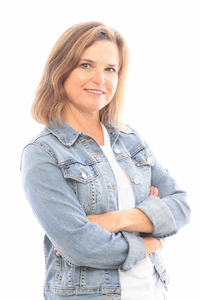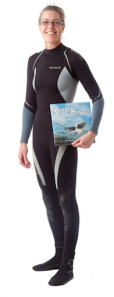I wanted to grow up to be Pam Schaller! She lives on a boat in Sausalito (or at least she did when I interviewed her for this article back in November of 2010). And she works with marine animals. She’s been able to work around the country -all in beach towns of course, as a marine biologist. The reason she caught our attention for this interview was she had just published a book about Pierre, one of the African Penguins under her care at the California Academy of Sciences in San Francisco and the first penguin in history to have bald spots restored!
While the official interview is below – this question that didn’t make the final cut – was my favorite – I had never heard of a moonbow (or is it moon bow) When you sailed to Tiburon from Hawaii… did you see anything surprising? What surprised me the most was having the sailboat completely stop very quickly in the middle of the ocean even though there was wind. My irrational fear went to the mythical sea monster the Kraken. It turned out it was a very large old fishing net that had wrapped the keel and propeller. The scary part was that if we hadn’t cut it off quickly the boat could have capsized.. I also saw my first Moon bow (rainbows that are created by the moon).
****8 The article as it appeared in the magazine*******
To the 38,000 creatures at the California Academy of Sciences, the fact that Pam Schaller has been riding a mini publicity wave after being written about in the book Pierre the Penguin: a True Story is not important. Nor is the fact that she saved Pierre’s life by tailoring the world’s first penguin wetsuit. What is important is that every day she shows up to work and monitors the temperatures, salinity and humidity of their habitats to make sure they stay alive. Recently Schaller agreed to share some details about her life, her work and how she came to make her home with her husband on a boat in Sausalito.
How long have you lived in Marin? Six years. I have lived in tourist towns throughout my adult life, and I find the carefree nature of tourists is inspiring.
How did you find your floating home? I was lucky enough to meet an academy employee named Daryl who gave me a copy of Latitude 38. He mentioned it was the best local sailing rag around. I found my sailboat and eventually even found the slip where I live through it.
Where did you grow up? I’d say I started to grow up post-college. Three places that taught me about beauty, love, life and true happiness: Idyllwild, Catalina Island and Oahu. Still growing up in Sausalito.
What influenced you to become a marine biologist? Some internal drive—the sound and smell of water is what wakes me up in the morning. Also, I spent a summer at a desk job as a financial intern.
You worked with reticulated giraffes and zebras at the Honolulu Zoo. What do you miss most about Hawaii? The zoo experience was interesting and challenging, especially hand-raising a giraffe calf. About Hawaii, I miss warm water, warm rain and the locals the most. They taught me so much about reading the ocean, especially knowing how the ocean floor determines the break of the waves.
Do you have a favorite lunch item at the academy cafe? Chicken tacos. They are simple, fast and satisfying. Also red and yellow beet salad when it’s available.
Did you like the movie Happy Feet? The concept of the movie was to teach the importance of learning to be true to yourself. This lesson is easy to teach to young viewers through animated penguins. As important, it brought penguins before an interested audience.
What do you think people don’t realize when watching Pierre with his buddies? The penguin communicates through body positioning, head movements and vocalizations. It can be a subtle difference between penguins courting each other and demonstrating dominance over each other (just as it can be between humans).
Do the penguins realize we are there when we wave to them from the other side of the glass? Yes, many of our younger penguins seem to seek out interaction with guests. Whether they are swimming and chasing running children or guests have something bright and shiny that catches the penguins’ eyes, penguins are essentially hardwired to be stimulated by action or shiny, flashy objects. That replicates the fish that is the most important element to their survival.
What is the easiest thing we can do to help wild penguins? Find out about the groups researching, rehabilitating or managing the wild populations, such as SANCCOB (Southern African Foundation for the Conservation of Coastal Birds).
Favorite restaurant(s) in Marin? Caffe Divino, Feng Nian, Thai Terrace, Poggio.
What is your favorite drink, and where do you like to enjoy it? Kettle soda at Paradise Bay. When I texted a good friend “In Paradise for happy hour,” I realized, that is an excellent epitaph. ** Paradise Bay is now Salitos — same great bay view and they still serve Kettle soda.

Mimi Towle has been the editor of Marin Magazine for over a decade. She lived with her family in Sycamore Park and Strawberry and thoroughly enjoyed raising two daughters in the mayhem of Marin’s youth sports; soccer, swim, volleyball, ballet, hip hop, gymnastics and many many hours spent at Miwok Stables. Her community involvements include volunteering at her daughter’s schools, coaching soccer and volleyball (glorified snack mom), being on the board of both Richardson Bay Audubon Center. Currently residing on a floating home in Sausalito, she enjoys all water activity, including learning how to steer a 6-person canoe for the Tamalpais Outrigger Canoe Club. Born and raised in Hawaii, her fondness for the islands has on occasion made its way into the pages of the magazine.


